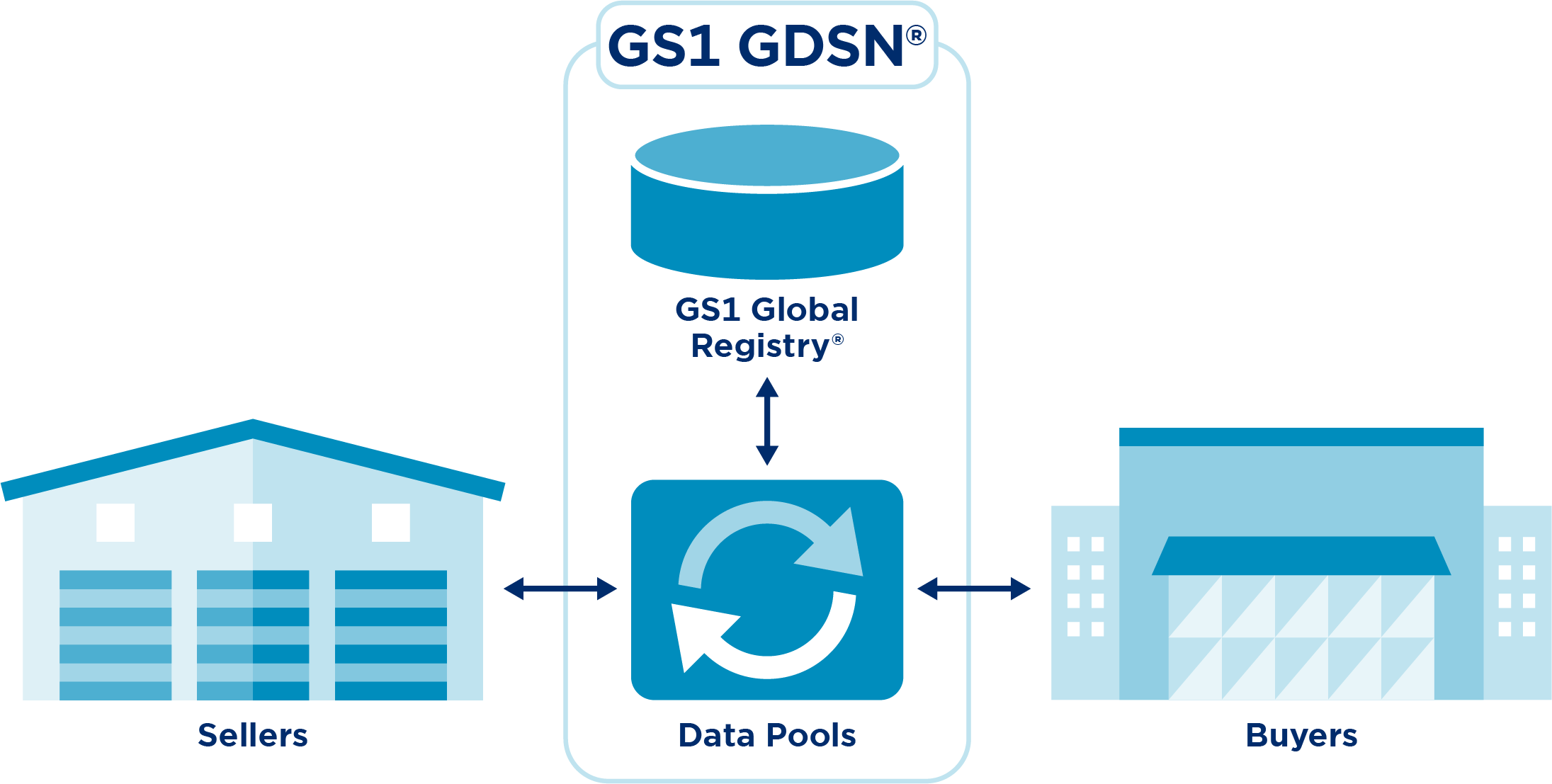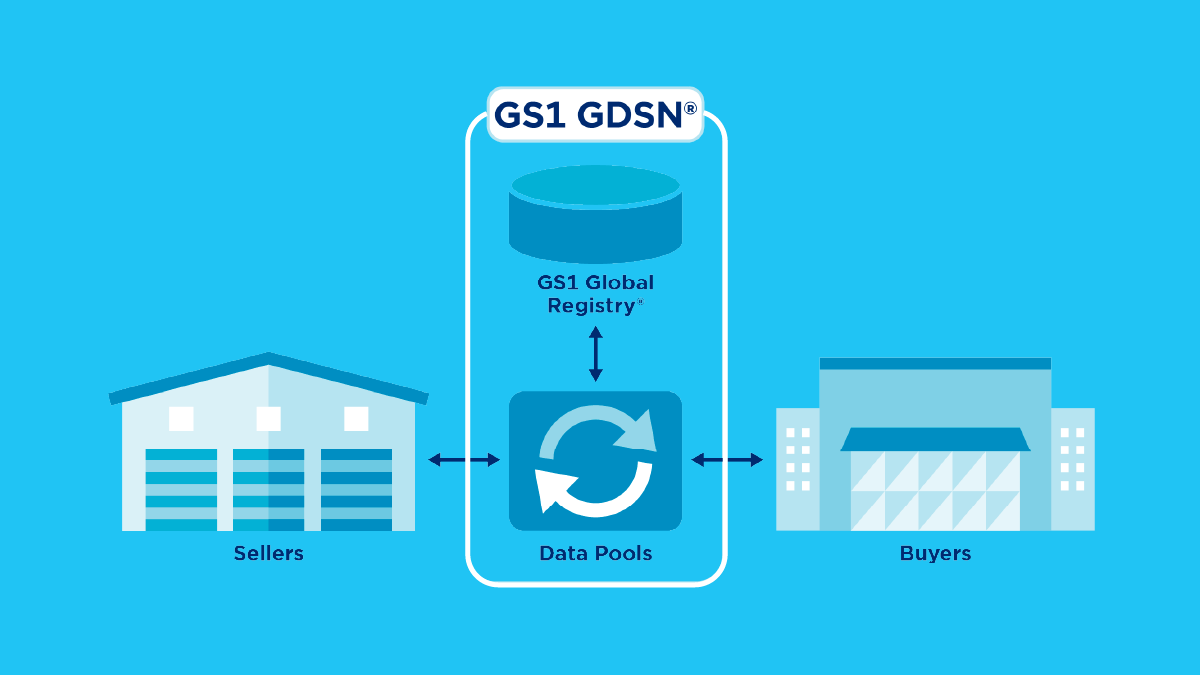Building trust with customers starts with secure data synchronization through GDSN
As an online consumer, how do you know a bag of chips doesn’t contain gluten or that your milk is lactose-free? How can you be sure your over-the-counter cold medicine has the right dosage? You read the product information on labels, online listings, etc.
The reason we can trust this information provided by brands and retailers is all thanks to GS1 standards and the Global Data Synchronization Network (GDSN). With these frameworks, companies can be sure they’re exchanging high-quality product data that meets industry standards.
What is GS1?
Think “product data rule-makers.”
The ‘GS’ in GS1 stands for ‘Global Standards,’ and it’s an international organization that develops standards-based solutions for exchanging product data. Acting as a neutral party, GS1 brings together industry leaders, government regulators, academia, and associations from all over the world to ensure consistency in the quality of product information as it’s shared across the globe.
The most obvious example of a GS1 standard is the barcode (that symbol on products that can be scanned electronically). Barcodes contain an identification number that makes it easy to track, process, and store products as they move across the supply chain and into the hands of consumers.
What is GDSN?
If GS1 is the governing body, GDSN is the system in which it governs.
The Global Data Synchronization Network is an “interconnected network of interoperable data pools and a global registry that enable companies around the globe to exchange standardized and synchronized supply chain data with their trading partners.” In other words, it’s where suppliers, retailers, distributors, hospitals, or wholesalers go to obtain, maintain, and exchange information about products in a standard format.
Here’s how it works: Suppliers upload their product data to “data pools,” which serve as a source of master data. That data is then sent to the GS1 Global Registry, which acts as an information directory and ensures all data pools comply with a standards-based set of validation rules. From there, trading partners can “subscribe” to these validated data pools to access the product data and use the information for sales and marketing purposes.
 Source: GS1
Source: GS1
This entire process ensures that product data shared between various players within the commerce ecosystem is accurate and compliant with universally supported standards and legislation. If a supplier updates their data to one of the data pools, the latest information is automatically and immediately provided to all other companies who subscribe to the data through GDSN — making the GDSN a single source of truth.
Who uses GDSN?
The GDSN is most commonly used by large corporations within the following sectors:
- Fast-Moving Consumer Goods (FMCG)
- Health & Beauty
- Pharmaceuticals
- Do It Yourself (DIY)
- Pets
- Garden
FMCG companies, for instance, need to share allergen information to ensure consumers aren't exposed to harmful ingredients, as well as production and expiration dates to promote food safety and reduce waste. Similarly, it’s becoming increasingly important for Health & Beauty brands to share their product ingredients as regulators and consumers demand more ‘clean beauty.’
What’s the value of GDSN? Why do you need GS1 certification?
The importance of maintaining accurate, up-to-date product data goes far beyond delivering positive shopping experiences. It’s a critical process to meet regulatory requirements, increase efficiency in the supply chain, and build trust with customers.
Regulatory compliance: Regulators are cracking down on what, how, and when information is shared with consumers about the products they buy. With different legislation across regions, companies need to ensure they’re maintaining compliancy in all of their markets. For example, US companies that do business in the European Union need to abide by EU1169 – a regulation for online CPG manufacturers and retailers about the information they provide about their food products. Now, the European Parliament has introduced new legislation that will hold companies to an even higher standard for product safety. Using the GDSN, businesses can avoid getting hit with a hefty fee or big lawsuit for not providing the right product data to customers.
Supply chain efficiency: Without the GDSN, trading partners have to verify the quality of data and exchange it amongst themselves manually. This is not a quick or fun process. When a supplier and retailer know they are looking at the same up-to-date and accurate data, it is smoother, quicker, and less expensive for them to do business together.
Consumer trust: The minute consumers come across inaccurate or outdated product information, you’ve lost their trust, and ultimately, them as customers. In a period of decreased spending, maintaining brand loyalty is crucial to avoiding lost sales to competitors. By exchanging product data through the GDSN before it makes its way to consumers, companies can rest assured their product information is trustworthy.
How to meet global product data standards
It starts with cutting out manual inputs of data.
Businesses that rely on manual processes to exchange product information with trading partners risk sharing incorrect data, as there’s more room for human error and outdated information. Plus, it’s extremely time-consuming.
Instead, find a GS1 partner who can help you automate the data exchange process. Productsup has a unique global partnership with GS1 and is connected with 39 data pools globally. Using our in-house platform, Certifai, we guarantee your product data is GS1 certified. The tool has highly intelligent OCR and AI models that can capture all of your data, resulting in higher data quality and less manual work for your team. That means our Retail PX customers are able to make all of their product information automatically available to all trading partners in the world securely and efficiently.
Learn more about Productsup Retail PX and how it guarantees all global product data standards are met.


